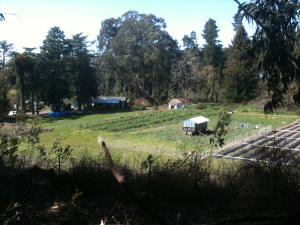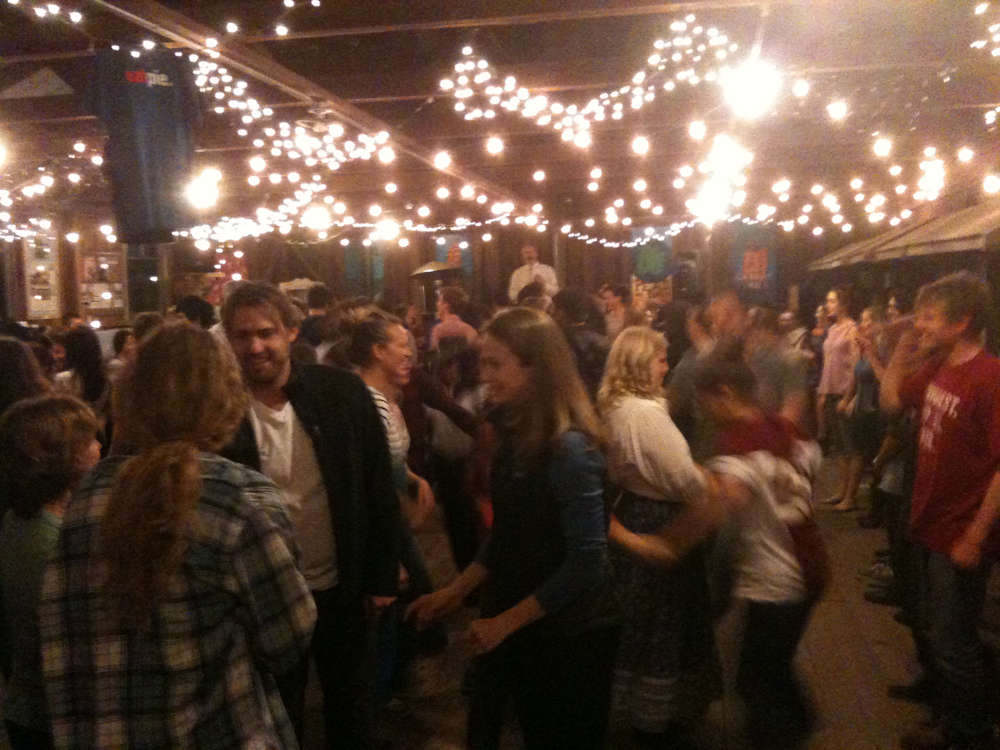
From hosting monthly barn dances to contributing to Stanford’s developing sustainable agricultural efforts, Pie Ranch, a working farm in Pescadero, Calif., has rapidly assumed an important role in the Stanford community.
Located about an hour’s drive away from campus, the ranch recently partnered with the Stanford Food Project in an effort to educate students about more nutritious and environmentally friendly farming practices, as well as co-hosting Stanford’s first annual Barn Dance at the Black Community Services Center (BCSC) last month.
“It is so successful there and so popular among Stanford students that the Stanford Food Project and I decided to have a barn dance here on campus,” said Amanda Martinez ’14, a member of the Stanford Food Project.
According to Martinez, the event was modeled after a Pie Ranch monthly event, including a potluck at the Lake Lagunita fire pit and a barn dance featuring the same caller that calls all of the Pie Ranch dances. Martinez also brought in the County Line Kickers, the band that usually performs at Pie Ranch.
“If it is as successful as we think it’s going to be, maybe we’ll make it a quarterly event—once a quarter or twice a quarter, we’ll have to see how it goes,” she said before the event.
Roots of a ranch
Located in the coastal town of Pescadero, Pie Ranch has at its heart the values of community and education through fresh, local food.
“One of the reasons I’m so grateful to be working at Pie Ranch is that [we are] so invested in working with these communities where youth are gaining exposure to alternative food systems and learning about what health and nutrition mean for them personally,” said Alexandra Villegas, youth development coordinator for Pie Ranch. “[We] teach them about cooking…and about the farm and where we source our food.”
Pie Ranch has operated as a working farm since 2005, three years after founders Nancy Vail, Jered Lawson and Karen Heisler purchased the pie-shaped plot of land with the intention of creating a model center of sustainable farming and education.
“The co-founders of Pie Ranch have always been invested in the idea of creating a space where students and youth can learn about the food system from seed to plate,” Villegas said. “That’s always been part of the vision of Pie Ranch.”
Work and dancing
Although some students—like Margaret Rawson ’12, who co-founded a Stanford Pre-Orientation Trip (SPOT) that educates incoming freshman about sustainable farming on the ranch, and Martinez—have worked closely with Villegas and Pie Ranch, others may be drawn more by the ranch’s monthly barn dances.
“They’re a lot of fun—it’s a relaxed environment [and a] beautiful space,” Rawson, The Daily’s chief operating officer and business manager, said. “I love the story of Pie Ranch—it’s shaped like two pieces of pie that meet in the middle, and of course, they make pie.”
Some students, such as Annie Osborn ’14, even serve as musicians during the festivities, assuming positions typically filled by older members of the Pescadero community.
“The barn dances have been going on for as long as Pie Ranch has been operating, and they tie into Pie Ranch’s vision because Pie Ranch is all about building community,” Villegas said.
According to Villegas, the barn dance begins with a “work day” at 2 p.m., followed by a 5 p.m. potluck and then the evening line dances.
“All three of those events are about getting to know your neighbors, talking to someone that you’ve never talked to before and having a dialogue about what food means to you and connecting over food,” Villegas said. “Food is a language that we all speak with and communicate with each other around.”
Having attended her first barn dance during her freshman year, Martinez suggested that the event has only increased in popularity on the Farm since.
“Every time I go, the barn is just packed and I see a ton of familiar Stanford faces, which is awesome,” she said.
In addition to barn dances, the ranch also offers farm tours for those curious about the inner workings of sustainable agriculture.
“They’re a great opportunity for people to learn all about the history of the farm,” Martinez said. “[The owners are] very transparent. They really like to talk to people all about their financial journey with Pie Ranch—how they’ve been able to fund it—because they want people to know that it is possible and they want people to feel empowered to start their own sustainable farms.”
Martinez noted that the range of crop and livestock offerings has gradually expanded to include everything needed—wheat for flour, chickens to produce eggs and berries to provide fillings—to bake a pie.
“[It’s] a really great experience…to see every step in the process, growing everything and then making it into a pie,” she said.
Martinez plans to intern at the ranch this summer while conducting research on carbon intake in the farm’s soil for her earth systems honors thesis.
“Not only are they a sustainable farm, but they also incorporate several different types of educational programs, like their internship and apprenticeship program[s], to train future farmers,” Martinez said. “They’re just creating this awesome culture around food, and they’re changing the local food system for the better.”
